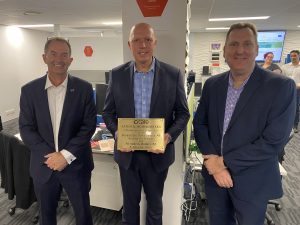Tucked away in a non-identifying office in Caloundra’s main street is a unique team of scam saviours helping hundreds of thousands of Australians who have fallen victim to cyber criminals.
The non-for-profit charity, IDCARE, is believed to be the only one of its kind in the world where people burdened with the guilt, shame and financial loss caused by cyber crime can turn for help.
Founder and managing director Professor David Lacey says demand for IDCARE’s free service is so massive that client numbers are almost doubling every two years as criminals “scale up” their activities to target millions of people.
This year IDCARE is already on track to help 80,000 to 100,000 people across Australia and New Zealand (about 80 per cent in Australia), which includes individuals as well as banks, government departments and agencies and businesses.
By comparison, since it was founded in 2014, IDCARE has assisted 200,000 Australians by “walking next to them”, as Professor Lacey explains, and helping people tidy up the mess created by the mostly overseas-based scammers.
IDCARE also has a team of analysts who trawl the “dark web” to gather statistics and spot trends, issuing alerts to industry and governments.
“If you haven’t heard of us that’s probably a good thing because it means you haven’t needed our service,” said Professor Lacey.
“But unfortunately they (scammers) do see Australia as good pickings. It’s busy times.”
Like stories about Sunshine Coast people doing great things? Help us deliver more by registering for our free daily news feed. All it requires is your name and email. See SUBSCRIBE at the top of this article
Professor Lacey said the typical scam victim was no particular type of person, age group or demographic but was representative of all parts of Australian society.
Most of the calls IDCARE receives are from NSW and Victoria.
“One in four people who come to us have no idea how criminals got their information and they’re often very angry,” he said.
“But a lot of people are embarrassed and feel shame and guilt and they don’t want to tell people about it.”

Professor Lacey said many victims just happened to get caught in the huge net cast out by what he described as cyber crime “super trawlers”.
Instead of selectively choosing their victims, these trawling criminals “cast their net far and wide in the hope they will get the fish in the moment”.
For example, they could send ten million texts, emails or robocalls impersonating a well-known company such as Amazon or a bank in the hope of hooking a victim who may have been expecting contact or was due to renew a service.
“They’re very plausible and the reason people fall for it is because they may have been expecting a call from their bank or the NBN. In that ten million people there will be those that are legitimately waiting for a call,” he said.
Professor Lacey said scams were becoming increasingly difficult for people to spot as criminals used phone numbers that were almost identical to legitimate business lines, or created phishing emails that closely mimicked the real thing.
Do you have a scam experience to share as a warning to others? Let us know via news@sunshinecoastnews.com.au
In the so-called “refund scam”, tech scammers manipulate the html code on legitimate websites such as banks in real time to fool victims into thinking too much money has been “refunded” which the victim is then asked to “pay back”.
“That’s a high-end deception but it must pay off because they’re still doing it,” he said.
Professor Lacey said scammers also worked in cycles or in response to “big shocks” and trends. For example during the pandemic when people were accessing early superannuation, a number of scams appeared in response.

At this time of year, as it nears tax time, he said scammers would begin impersonating the Australian Tax Office (ATO) until about October.
He said the current most common scams were phone scams impersonating banks and telcos; phone scams where the criminals remotely access your devices, such as claiming to be eradicating viruses; and parcel delivery scams where they trick people into clicking links on fake parcel delivery notices.
Professor Lacey said if IDCARE was “quick”, his case managers could sometimes help people recoup their money, but most of the time their role was about helping people restore their identities and secure accounts, including social media.
Clients are allocated a case manager — a “real person” who will help them navigate the often impersonal maze of agencies and departments they are forced to deal with to change drivers licences, dispute transactions, clean credit reports and reclaim social media profiles.
IDCARE, which relies on donations and funding, was recently promised $6.1 million from the Federal Government to cover services for 54,000 Australians over the next four years.

The funding was announced this week by the Defence minister Peter Dutton and Member for Fisher Andrew Wallace during a visit to the Caloundra headquarters.
“I’m sure we’ve all experienced those fake calls from the Australian Tax Office, or the ads for products that are too good to be true, but every year these scams are getting more
sophisticated,” said Mr Wallace.
“The ACCC’s Targeting Scams report found that in 2019 alone Australians lost more than $634 million to these online crimes. Through IDCARE, the Sunshine Coast is leading the way in fighting back.”
In his 20 years involved in the area, Professor Lacey said money lost by Australians had doubled.
Mr Wallace said a cyber crime was reported to the Australian Cyber Security Centre (ACSC) every 10 minutes, however most incidents went unreported.
“It makes my blood boil to see these crooks trying to steal money from hardworking and
often retired Australians. Scams, cybercrimes and identity crimes impact every one of us.”
For more information on IDCARE visit www.idcare.org





